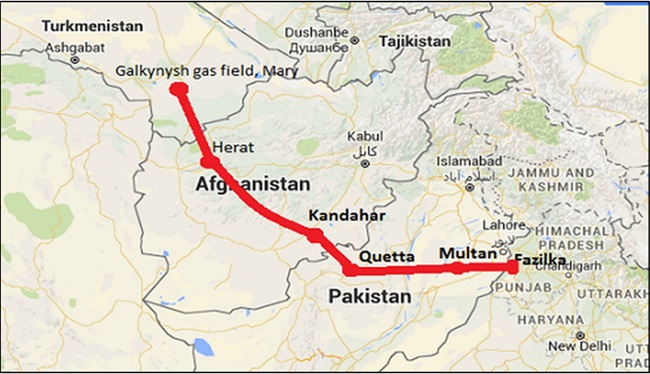About TAPI Gas Pipeline Project

Introduction
- The project is a natural gas transmission project through which 33 billion cubic metres of gas will be transferred annually from Turkmenistan to three South Asian countries.
- It is one of the largest gas transmission projects in the region.
Name
- The name TAPI is an abbreviation of Turkmenistan, Afghanistan, Pakistan, India. The total length of this pipeline is about 1814 km.
- It is also known as the Trans-Afghanistan Pipeline.
Start
- The foundation stone of the project was laid on December 13, 2015 in Turkmenistan and is scheduled to be completed by the year 2019.
Construction
- It is being developed by Galkynysh-TAPI Pipeline Company Limited with the participation of Asian Development Bank.
- The pipeline will be built along the Kandahar-Herat highway in western Afghanistan and then through Quetta and Multan in Pakistan.
- The final destination of the pipeline will be the city of Fazilka in Punjab, near the Indian border.
Beneficiary countries
- Under this project, a pipeline from Turkmenistan's Galkynysh gas field will pass through Afghanistan to Pakistan and then to India.
- Under the project, India and Pakistan will buy 42-42% of the natural gas and Afghanistan will buy 16% of the gas.
- The Galkynysh gas field is estimated to have reserves of about 16 to 26 trillion cubic meters of natural gas.
Implications for India
- India's energy demand is constantly increasing due to population growth, urbanization and industrialization. TAPI provides an additional source of energy to meet this growing demand.
- TAPI enhances India's energy security. Diversifying energy sources also helps reduce the risks associated with dependence on a single country or region for energy imports.
- The TAPI gas pipeline will play an important role in strengthening regional cooperation diplomatic relations between India, Turkmenistan, Afghanistan and Pakistan.
- The increased use of natural gas in India's energy mix can contribute to efforts to address environmental concerns and reduce air pollution.
- The TAPI pipeline plays an important role in India's long-term energy planning by ensuring a stable supply of natural gas for the future. This can be important for meeting the country's energy needs in the coming decades.
Challenges Regarding the TAPI Pipeline
Security Concerns:
- Instability in Afghanistan: The pipeline’s route through Afghanistan raises significant concerns, as the country faces political instability, insurgent activities, and humanitarian crises.
- Financing and Administration:
- Lack of financing: The Asian Development Bank (ADB) has committed to support the project, but most of the financing comes from private investors, which is challenging due to the volatility and high risk of the region.
- Complex administration: The involvement of four countries, each with its own administrative system, complicates project management and smooth implementation.
- India-Pakistan Tensions:
- Political hurdles: Given the historical tensions between India and Pakistan, there are concerns over the long-term cooperation needed for the pipeline to be successful.
- Environmental Concerns:
- Impact of Natural Gas: The natural gas extraction process can cause water pollution, soil erosion, and even seismic activity. Additionally, natural gas is still a fossil fuel that contributes to greenhouse gas emissions.
Conclusion
The TAPI pipeline has the potential to transform regional energy dynamics and foster greater economic cooperation across South and Central Asia. The TAPI pipeline promises to bring significant environmental, economic and strategic benefits, but its success depends on resolving key challenges, including security issues in Afghanistan, financing and political tensions between India and Pakistan.


